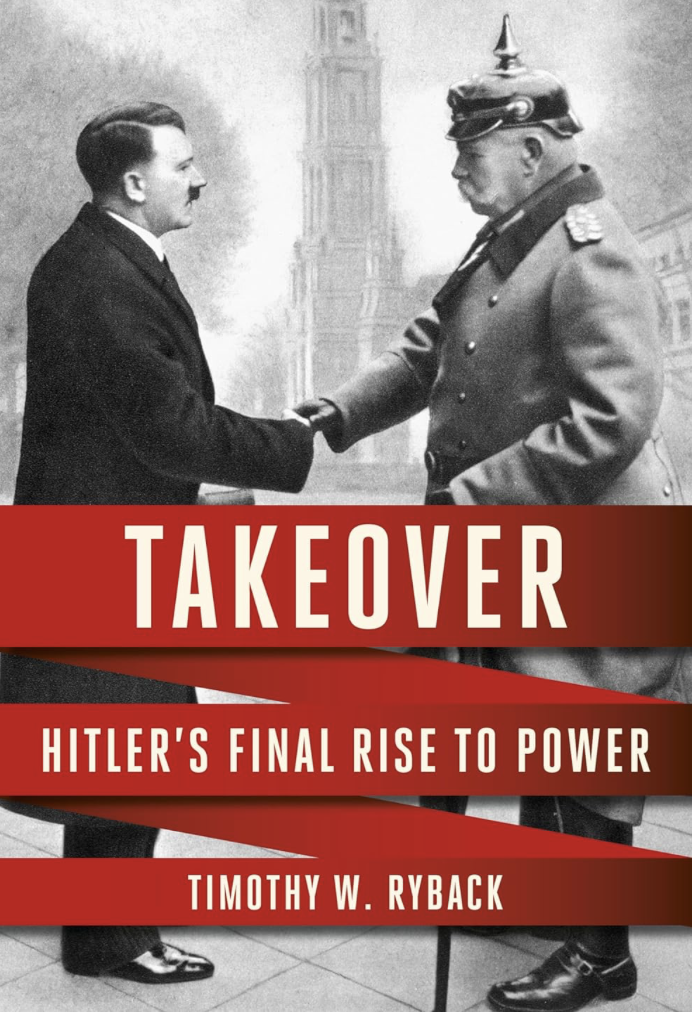Takeover - Hitler's Final Rise to Power
Takeover - Hitler's Final Rise to Power
Timothy Ryback, 2024
 Another history-of-Nazi-Germany book, Takeover details the last year or so but especially the final few months leading up to Hitler being appointed the Chancellor of Germany. The fundamental question on the table, staring at us all, is how a constitutional democracy like Weimar Germany reach the point where a man and party who's stated goal was to tear down Democracy was legally put in power ? I'd always sort of assumed there was some skullduggery involved, an assassination, a poisoning, a coup, etc. But that is not the case. Hitler and his party took over the government almost entirely without extralegal activity.
Another history-of-Nazi-Germany book, Takeover details the last year or so but especially the final few months leading up to Hitler being appointed the Chancellor of Germany. The fundamental question on the table, staring at us all, is how a constitutional democracy like Weimar Germany reach the point where a man and party who's stated goal was to tear down Democracy was legally put in power ? I'd always sort of assumed there was some skullduggery involved, an assassination, a poisoning, a coup, etc. But that is not the case. Hitler and his party took over the government almost entirely without extralegal activity.The setup naturally has ominous echos to the current day, where we're seeing a resurgance of far-right energy. Even more specifically the parallels are troubling:
- A charismatic leader..
- Who's main message is "let's go back to the good old days"
- Who's other message is that the government is no good and should be torn down. (Hitler's desire for a monarchy instead of a republic was entirely explicit)
- Who nods and winks at right-wing extremism and violence
- Who villifies classes along nationalist lines
- Who is a master of instigation and media
- etc
But there are some differences.
Private Militias One of the many constraints placed on Germany by the Treaty of Versailles was the limiting of the national army to 100,000 troops. In view of what had just gone down this seems sort of reasonable, but for some reason neither the treaty nor the constitution it framed had anything to say about private militias. According to the book, these were entirely legal and substantial. Remember that Germany had just lost WWI and so had a ton of ex-soldiers who felt bad.
- On the left, the communists had several private militias
- On the right were the National Socialist's (Nazi) militia as well as many other right-wing groups. According to Wikipedia just one of the right-wing militias numbered 500,000 men !!
These aren't just hobbiest groups, these are real armed militias. Together the private militia vastly outnumbered the state army.
My read is that a big part of why President Hindenburg finally agreed to appoint Hitler as chancellor was the fear of these private militias going berserk and starting a civil war.
An unweildy constitution The consititution of Weimar Germany was, in my opinion, too mercurial - it allowed various parties to block legislation or dissolve the legislature far too easily.
I learned about this book via an article in The New Yorker. The sub-heading of that article is The Nazi leader didn’t seize power; he was given it. I take issue with this characterization of the material presented in this book. This summary vast underplays the energy and determination and strategy brought to bear by Hitler and the Nazi's, and overlooks the very great reluctance and fear of Hitler which were present in the government and houses of the powerful at the time. The following sub-sub-heading is especially misleading, in my opinion: The media lords thought that they could control him; political schemers thought that they could outwit him. The mainstream left had become a gerontocracy. And all of them failed to recognize his immunity to shame This is absolutely not the impression I got from reading this book. This suggests that it was primarily through the misguidance of other players that Hitler came to power. In my read, the only instance of this sort of action was in the very final installation of Hitler as chancellor, when his frenemy Alfred Hugenberg was positioned as a sort of co-leader and who's agreement was required for the Hitler-as-chancellor scheme to work. Hugenberg was a far-right German media mogul who historically locked horns with Hitler. He allowed himself to be talked into supporting Hitler's chancellorship by telling himself that Hitler could be controlled, but he only held this opinion for a matter of days, and the opinion absolutely did not figure prominently in the months and years leading up to that point.
Regarding the book itself, Takeover is far too fine-grained for my tastes. It seems primarily useful to people who want to write books like Takeover. It goes hour by hour, minor incident by minor incident, and I found it difficult to bring my head above the details and see the lay of the land.
For more on the topic of Nazi Germany, see my review of Hanna Arendt's Origins of Totalitarianism